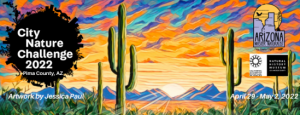SARSEF Series: Harnessing the Power of Community Science for Research
Using iNaturalist for Student Research
Wednesday, April 13, 2022 from 4-5 pm Click here to register in advance for this meeting Join us for a presentation and discussion about using iNaturalist, a community science app, as a tool for student research. Featured guests are Molly Hunter, UArizona Associate Research Professor in the School of Natural Resources and the Environment, and Isabel Ross, a senior at Cienega High School. Isabel’s study that she entered into the 2021 SARSEF science fair was ‘Bighorn Fire: Effects on Wildlife in the Santa Catalina Mountains’. Isabel was chosen to proceed on from the SARSEF competition and virtually attend ISEF and National Junior Science Humanities Symposium in 2021.
iNaturalist and the National Phenology Network: Recording Biodiversity
Tuesday, April 19, 2022 from 4-5 pm Click here to register in advance for this meeting We’re hosting Theresa Crimmins, Director for the USA National Phenology Network (USA-NPN), for a presentation about using community science resources to document and learn about biodiversity and phenology (the timing of seasonal life cycle events). Also a Research Professor in the School of Natural Resources and the Environment at the University of Arizona, Theresa works enthusiastically to support the growth and use of phenology data and resources curated by the USA-NPN, involvement in Nature’s Notebook, and a broader appreciation of phenology among scientists and non-scientists alike. The USA- NPN uses the internet to bring together community scientists, government agencies, non-profit groups, educators, and students of all ages to monitor the impacts of climate change on plants and animals in the U.S.
How Community Science Data is Used in Research
Tuesday, April 26, 2022 from 4-5 pm Click here to register in advance for this meeting In this presentation, you will learn how scientists use data from iNaturalist and other community science platforms in their research. SARSEF and the Pima County Master Naturalists welcome University of Arizona researcher Katy Prudic, an entomologist interested in discovering how ecological and evolutionary interactions promote biodiversity and how they can inform conservation decision making. She is co-director of eButterfly, an online citizen science platform that harnesses the observations of thousands of butterfly enthusiasts across the globe to understand how and when butterflies and other pollinators react to environmental changes. Her research encompasses precision conservation, human-computer networks, and data science.

